Further v. Farther
« previous post | next post »
Apparently, further and farther come from the same source, namely the verb that we retain as further meaning "to promote". The different spellings were originally due to the general diversity of English orthography in earlier times. And the spelling was apparently not regularized because the word(s) took over as the comparative form of far, which used to be farrer. But because of the similarity of meanings, both forms seem always to have been used in the full range of adjectival and adverbial meanings, though with some probabilistic influence of far's spatial sense on the vowel.
From the 1895 OED entry for farther (not revised since then):
Middle English ferþer (whence by normal phonetic development farther ) is in origin a mere variant of further n., due probably to the analogy of the verb ferþren < Old English fyrðrian to further v. The primary sense of further, farther is ‘more forward, more onward’; but this sense is practically coincident with that of the comparative of far, where the latter word refers to real or attributed motion in some particular direction. Hence further, farther came to be used as the comparative of far; first in the special application just mentioned, and ultimately in all senses, displacing the regular comparative farrer. In standard English the form farther is usually preferred where the word is intended to be the comparative of far, while further is used where the notion of far is altogether absent; there is a large intermediate class of instances in which the choice between the two forms is arbitrary.
Ben Yagoda considered the issues in "A Further Piece", Lingua Franca 2/18/2015, artfully bringing in basketball, LSD, and blues lyrics. He points out that further has been gradually winning in all uses, showing the Google Ngrams plot for go further vs. go farther:
The plot for simple further v. farther makes the same point even more strongly. (I've multiplied the percentages by 10000 so that the y-axis reads in counts per million.)
We can see the same point in the ratio "further/farther":
But not all f_rther expressions have followed the same path. Thus "f_rther from the truth" begins to diverge sharply around 1940:
But "f_rther down the road" doesn't furtherize until 1970:
And "f_rther apart" shows a burst of farther enthusiasm around 1880, which didn't entirely go away until 1970 or so, with "farther apart" still maintaining a narrow lead:
And "f_rther away" shows a similar pattern:
Though erratically, farther likewise makes a push at the end of the 19th century in "f_rther from home", and has remained in the lead to the present day:
This is all more or less consistent with idea that farther is somewhat preferred for more spatial uses. But overall, it supports the view that every expression has its own history, at least to some extent, as if (a form of) construction grammar were in tension with a recursively compositional system.
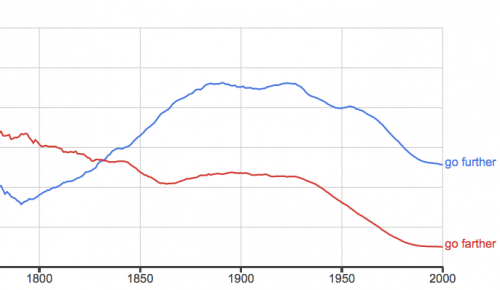
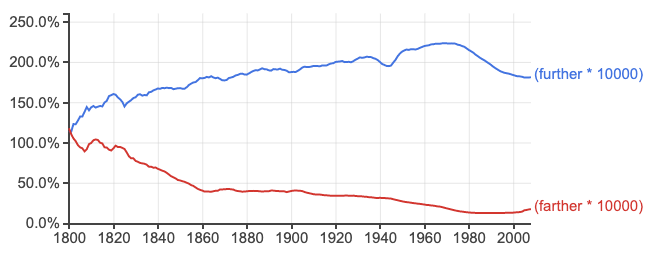
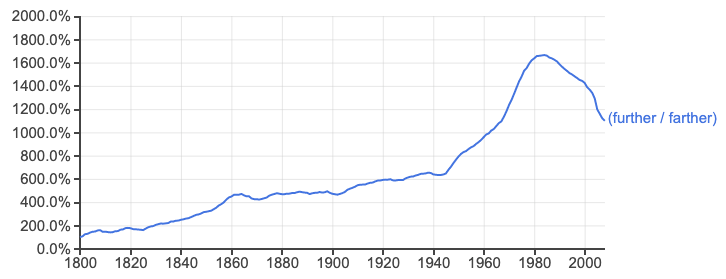
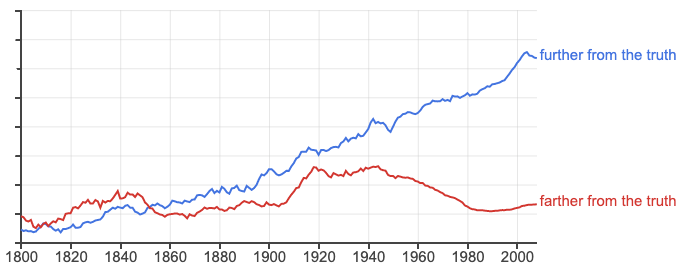
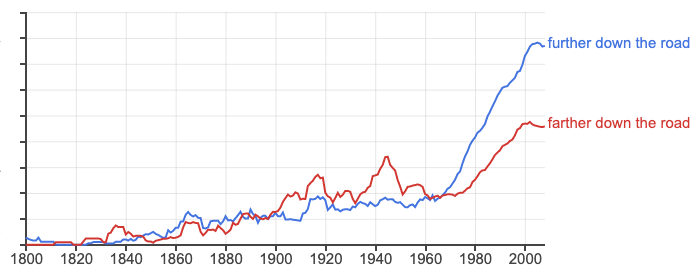
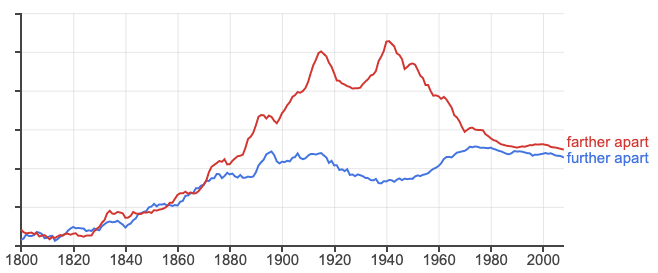
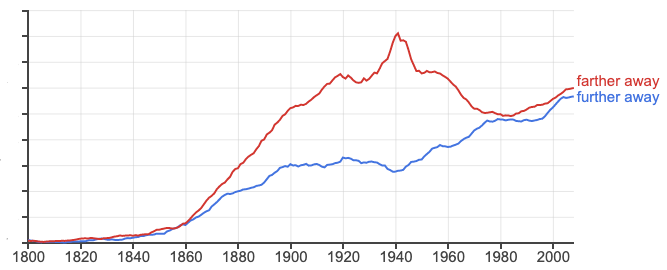
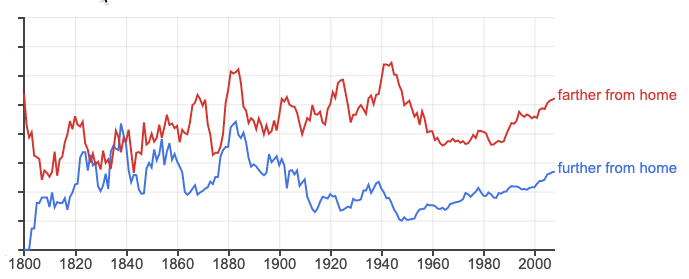
Benjamin E Orsatti said,
January 17, 2020 @ 8:03 am
This is why I love this site: Things that you've always wondered about are put under methodological scrutiny and examined.
So, Mark, now that you've given us the "what", what about the "why"? Is it one or more of the following?:
(1) As society becomes more industrialized and technological, people think less and less "spatially", that is, in terms of "distance";
(2) "Farther" takes slightly longer to say than "further" because you have to prolong the "a" to distinguish it from "further", where the "u" is really either a schwa or a syllabic "r", and you have to open your mouth slightly wider as well;
(3) The rule of three compels a third option, but I got nothing. How about: "Isaac Newton dealt a mortal blow to "farther" with his comment about treading upon large people"?
[(myl) And your third option will lead us down the OTSOG rabbit hole, where there are many wonderful things to see…]
mistah charley, sb, ma, phd, jsps said,
January 17, 2020 @ 8:26 am
Speaking of vowels, yesterday I read something written by an Englishperson using "rise" as a noun – the context made it clear that they meant what I would call a "raise" – I wondered if this was merely a typographical error or an actual variant use.
Dick Margulis said,
January 17, 2020 @ 8:32 am
In a recent discussion in a large group of editors (more than 8,000 group members), it was noted that the editorial distinction between farther (spatial) and further (all other) is observed almost exclusively in AmE, with various style guides* promoting that practice; and that in BrE, farther has almost entirely disappeared in edited text. Indeed, if you run the above comparisons separately for British English and American English, you'll see the difference.
* Most editors understand that style guides consist of arbitrary choices among acceptable alternatives; they are not arbiters of correctness. However, they do affect the corpus and thus influence usage (in print) over time.
Gali said,
January 17, 2020 @ 8:44 am
Indeed, I more or less consider farther to be marked AmE. There's no usage for farther which I would regard as idiomatic in my idiolect, and my general perception is that I have encountered the word almost exclusively in AmE contexts.
yoandri said,
January 17, 2020 @ 8:49 am
farther seem like overall dissimilation since earlier it could be iguess "ferrer" (most are ars come from ers). but in scots further is dissimilation too or could be.
Timothy Rowe said,
January 17, 2020 @ 9:25 am
The difference is considerably more marked in British English than in US English: https://books.google.com/ngrams/graph?content=further%3Aeng_gb_2012%2Cfarther%3Aeng_gb_2012%2Cfurther%3Aeng_us_2012%2Cfarther%3Aeng_us_2012&year_start=1800&year_end=2008&corpus=15&smoothing=3&share=&direct_url=t1%3B%2Cfurther%3Aeng_gb_2012%3B%2Cc0%3B.t1%3B%2Cfarther%3Aeng_gb_2012%3B%2Cc0%3B.t1%3B%2Cfurther%3Aeng_us_2012%3B%2Cc0%3B.t1%3B%2Cfarther%3Aeng_us_2012%3B%2Cc0#t1%3B%2Cfurther%3Aeng_gb_2012%3B%2Cc0%3B.t1%3B%2Cfarther%3Aeng_gb_2012%3B%2Cc0%3B.t1%3B%2Cfurther%3Aeng_us_2012%3B%2Cc0%3B.t1%3B%2Cfarther%3Aeng_us_2012%3B%2Cc0
Philip Taylor said,
January 17, 2020 @ 9:30 am
It would seem that I (an L1 <Br.E> speaker) do use "farther", at least in the spatial sense :
Ursa Major said,
January 17, 2020 @ 9:59 am
'Farther' has always seemed to me to be old-fashioned British English, and when I hear/read it I always think the person using it is putting on an affectation. But maybe they are just Americans using it naturally…
The reason is because it has a strong association for me with Winnie the Pooh accompanied by a concept of 'somewhere down the road'. I have a recollection from when I was very young of asking my mother (whose native BrE was probably still the major influence on my forming NZE) about the strange spelling. So I think my first exposure to the word must be this sentence from "Winnie-The-Pooh":
"Piglet said that the best place would be somewhere where a Heffalump was, just before he fell into it, only about a foot farther on."
Btw the online texts of "Winnie-The-Pooh and "The House at Pooh Corner" that I found both contain both 'farther/est' and 'further/est', although I don't know if that was Milne's usage, his original editors, or an artifact of the editorial history of the texts I looked at.
Andy Stow said,
January 17, 2020 @ 10:28 am
As a British-American who spent his first eight years in England, this helps me understand why I can never remember how to spell this word!
I probably use "farther" most frequently.
Doctor Thess said,
January 17, 2020 @ 11:22 am
Mistah Charley: "Speaking of vowels, yesterday I read something written by an Englishperson using "rise" as a noun – the context made it clear that they meant what I would call a "raise" – I wondered if this was merely a typographical error or an actual variant use."
I'm an American and thus have no firsthand knowledge, but I would note that the Pink Floyd song "Money" includes the line "But if you ask for a rise it's no surprise that they're giving none away". Given the internal rhyme with "surprise" I would say that what you read was no typo.
Leo said,
January 17, 2020 @ 11:45 am
The decline of "farther" in Britain may – but then again may not – have been influenced by non-rhoticity, which makes the word a homophone of "father" for most English people.
Buzz79 said,
January 17, 2020 @ 12:07 pm
Mistah Charley and Doctor Thess: There's also the Dick Gaughan (a Scot} song "The Pound a Week Rise."
RfP said,
January 17, 2020 @ 12:39 pm
“Rise
“noun
“14. Chiefly British An increase in salary or wages; a raise”
– American Heritage Dictionary
Phillip Helbig said,
January 17, 2020 @ 12:39 pm
"Speaking of vowels, yesterday I read something written by an Englishperson using "rise" as a noun – the context made it clear that they meant what I would call a "raise" – I wondered if this was merely a typographical error or an actual variant use."
As Doctor Thess said, Roger Waters got it right. :-) This is one of the standard differences (i.e. one term used almost exclusively in the USA, the other almost exclusively in the British Isles) between American and British English, like hood/bonnet, trunk/boot, sidewalk/pavement, and so on. Then there is "table the motion", which means opposite things on opposite sides of the pond.
Perhaps next week a discussion on backward vs. backwards, forward vs. forwards, and so on.
Philip Taylor said,
January 17, 2020 @ 1:11 pm
"a discussion on backward vs. backwards, forward vs. forwards, and so on". And perhaps "whilst" v. "while", "amongst" v. "among", etc. ?
J.W. Brewer said,
January 17, 2020 @ 2:04 pm
To Ben Zimmer's discussion of the Merry Pranksters' "Furthur," I offer as a counterexample confirming the variability of usage amongst the long-haired hippie set this: https://en.wikipedia.org/wiki/Farther_Along_(The_Byrds_album). OTOH, someone with more time than I have right now could try to track down a large number of different performances of the title track (a public-domain gospel number) and see if there is orthographic variation.
Morten Jonsson said,
January 17, 2020 @ 3:28 pm
@J.@. Brewer
I haven't tracked down a large number of different performances of "Farther Along," but I've always seen and heard it as "farther." According to the website hymnary.org, on the song's first appearance in print, in a 1911 hymnal, the title was "Further Along." But in all later hymnals listed as including it, from the thirties on, it's "Farther Along."
I don't know if that was a deliberate choice on someone's part–I rather doubt it–but I find it rather poignant. "Farther along" is a metaphor–referring to our journey along life's road–and so the figurative "further" would seem to be called for. But "farther" seems to make the journey a literal one, a road the singer is actually walking.
Christian Weisgerber said,
January 17, 2020 @ 5:08 pm
@Phillip Helbig
Where "pond" means Lake Ontario.
David Marjanović said,
January 17, 2020 @ 7:20 pm
That would work for rhotic accents. In non-rhotic (…arrhotic?) accents, further is [ˈfɜːðə] and doesn't take any less time to say than farther [ˈfɑːðə].
Andrew Usher said,
January 17, 2020 @ 7:29 pm
I'm personally with Newton here – whatever the history, 'farther' has been around long enough to deserve recognition as the comparative of 'far'.
Morten Jonsson:
I imagine that it in the OED's class of 'intermediate forms', where there is no literal distance, but the use could easily be taken as a metaphor for it. In such cases I prefer 'farther' as much as I do for literal distance – following the normal rule for metaphor.
It's strange that discussions of this difference always seems to omit the superlative form farthest/furthest, where there is no possible confusion with the verb or conjunction 'further' (or the sense in 'one further point', though farther used to be acceptable even there). Thus I'd expect a greater preference for 'farthest', even exclusive for some. The same goes for the expression 'all the farther (further)'.
Philip Taylor:
Is it a coincidence that Americans always seem to prefer the shorter form: i.e. backward, forward, while, among from your list?
Phillip Helbig:
Since the stupid timer fell on the last thread, could you explain just what you meant by being 'shot for nude sunbathing'? I am none the wiser, summary execution not being a penalty for that or any similar offence.
k_over_hbarc at yahoo.com
RP said,
January 17, 2020 @ 8:08 pm
I (a BrE speaker) am among those who use "further" exclusively.
Already in 1927, H. W. Fowler regarded the OED's proposed distinction as "too strong a statement: a statement of what might be a useful differentiation rather than of one actually developed or even developing. The fact is surely that hardly anyone uses the two words for different occasions; most people prefer one or the other for all purposes, and the preference of the majority is for 'further'… On the whole, though differentiations are good in themselves, it is less likely that one will be established for 'farther' and 'further' than that the latter will become universal."
@Leo ("The decline of "farther" in Britain may – but then again may not – have been influenced by non-rhoticity, which makes the word a homophone of "father" for most English people."):
That's an interesting idea. On the whole I find it unlikely, but it could use further study. There are a good many homophones created by non-rhoticity. Shortly before writing this comment I read an article noting that the British member of parliament Rebecca Long-Bailey had referred in a speech to a pawn shop "before adding – 'that’s P.A.W.N.'" (probably more as a joke than out of a genuine fear of misinterpretation, though) ( https://labourlist.org/2020/01/long-bailey-vows-to-deliver-socialism-is-aspiration-message-to-voters/ ).
RP said,
January 17, 2020 @ 8:19 pm
Ah, I see Ben Yagoda's Lingua Franca piece quoted Fowler. Of course, what it didn't do was point out that Fowler was writing from a BrE perspective – the evidence adduced in Timothy Rowe's comment above suggests that in the 1920s BrE was already further along than AmE in terms of abandoning any distinction that might once have existed (though Fowler was obviously sceptical that it ever had).
Joe Fineman said,
January 17, 2020 @ 8:41 pm
I have seen "rise" (n., for "raise" in U.S. newspapers, but I have never heard or seen it elsewhere in the U.S. My immediate notion was that the reason was that "rise" fits better into a headline; but some kind of pedantry is also a possibility.
dw said,
January 17, 2020 @ 8:47 pm
@Andrew Usher: Is it a coincidence that Americans always seem to prefer the shorter form: i.e. backward, forward, while, among from your list?
But "anyways" (as opposed to "anyway") seems far more popular in the US.
RP said,
January 17, 2020 @ 9:10 pm
@Andy Stowe ("As a British-American who spent his first eight years in England, this helps me understand why I can never remember how to spell this word!")
Surely it is not simply a question of spelling. Or are there people who pronounce the two words the same? (If so, this isn't noted in the dictionaries I checked).
@Mistah Charley and Joe Fineman,
In the OED, the BrE sense of "rise" to mean a pay rise is not cited until 1845.
The "originally US" sense of "raise" (labelled "North American" by Lexico) is first cited in 1898.
Both are simply more specific uses of the noun "rise" (which can mean an increase in quantity of anything, such as prices, interest rates, etc) and of the noun "raise" (similar meaning: "chiefly US") respectively.
Anne Cutler said,
January 17, 2020 @ 10:36 pm
@Benjamin E Orsatti's 2nd point. As a non-rhotic speaker, I had felt certain by the time I read down to the 1st Ngram plot that of course there's an articulatory issue, it's way easier to say "go further" than "go farther"! And look (6th plot, "farther apart") when there's no place of articulation shift required, there's no advantage for "further" at all! So, as I launched into the comments section, I was primed to agree with that point 2. All the more surprised that so many other potential issues were raised. (Even avoidance of homophony, which languages basically do NOT seem inclined to do – repurposing existing forms is always more likely than devising novel ones.) Are the historical phonologists here able to estimate the relative role of speech production benefit compared to other factors in usage preferences?
Michael Watts said,
January 17, 2020 @ 11:21 pm
It's interesting to me that this reports a difference between British and American English — the word for "an increase in salary" is different — but dramatically misstates what the difference actually is. Obviously there's no difficulty in American English with using "rise" as a noun — it is permitted, and "raise" is not, for increases in anything other than salary. We don't talk about "raises" in the water level, the tax rate, the temperature, or anything else.
Michael Watts said,
January 17, 2020 @ 11:31 pm
As far as I know, the -n- of the alpha privative does not appear before consonants, so arhotic. (Of course a rho can't be aspirated mid-word either; I can't answer whether it would be better to say "arotic".)
Michael Watts said,
January 18, 2020 @ 3:49 am
Correction: it is the norm for alpha privative to double a following rho, even though it doesn't take the -n- form for other following consonants. Thus arragḗs "unbroken" from rhḗgnymi "break"; árraphos "seamless" from ráptō "sew", and so forth. By convention in English we have "arrhythmia" where the Greek has "arrythmía", so there's nothing more to say against "arrhotic".
Michael Watts said,
January 18, 2020 @ 3:54 am
(Further correction: there's no such thing as an unaspirated word-initial rho; thus "ráptō" is impossible and should have been "rháptō". Sigh.)
Antonio L. Banderas said,
January 18, 2020 @ 8:15 am
Only further is used in the adverbial sense "moreover" and in the adjectival senses "more extended" (no further comment) and "additional" (Further bulletins came in).
"All the farther (or further)" in place of "as far as" occurs chiefly in informal speech: This is all the farther the train goes.
"Furthermost" is a fairly rare equivalent of farthest (not furthest).
Roscoe said,
January 18, 2020 @ 8:23 am
From “Horse Feathers” (1932):
FRANK: Anything further, Father?
WAGSTAFF: “Anything further, Father?” That can't be right. Isn't it “Anything Father, further?”
Antonio L. Banderas said,
January 18, 2020 @ 10:21 am
I still do not get the pun in "Anything Father, further?"
https://www.youtube.com/watch?v=EBHLcBxQZiM&feature=youtu.be
Philip Taylor said,
January 18, 2020 @ 10:48 am
I don't think any pun (qua pun) is intended, Antonio. It is simply (to my simple mind, at least) just humour. I found it moderately funny.
Philip Taylor said,
January 18, 2020 @ 10:51 am
I have never heard this expression in British English, whereas "furthermost" is something I encountered fairly regularly, in contexts such as "the furthermost reaches of the …" (Amazon, British Empire, Mafia, whatever).
Morten Jonsson said,
January 18, 2020 @ 11:07 am
@Antonio L. Banderas
For Groucho, "father" and "farther" are pronounced the same (or close to the same–listen to how he tweaks the pronunciation a little). So he's questioning whether Zeppo should have said "further" or "farther." But switching the two words puts "further" in the place of "Father," which turns the whole thing into lovely nonsense. Very S. J. Perelman, and I'd guess that it's one of the lines in the movie that he was responsible for.
Rose Eneri said,
January 18, 2020 @ 11:18 am
AmEng speaker here – I maintain a distinction between farther (referring to spacial distance) and further (referring to advancement of something non-physical).
I can't imagine saying that one place is "further" than another. To me, farther is the comparative of far. "Ireland is far; India is farther." Further can't be a comparative because there is no "fur" (except on animals).
I understand why non-rhotic speakers would want to change farther to further because farther and father would be homonyms. And I understand why farrer would have changed to farther. It is amusing to imagine how a non-rhotic speaker would even say "farrer."
I had a neighbor from Boston who introduced himself as "Kaah." It took me a while to understand that his name was Carl.
Rose Eneri said,
January 18, 2020 @ 11:24 am
Now, a comment on rise/raise.
In AmEng,
"I'm going to get a rise out of my boss" might be you fired.
"I'm going to get a raise out of my boss" might get you more money.
Rodger C said,
January 18, 2020 @ 11:40 am
But "anyways" (as opposed to "anyway") seems far more popular in the US.
I perceive this, rightly or wrongly, as a Northeasternism.
RP said,
January 18, 2020 @ 12:20 pm
If there were such a word as "farrer", the "r" would be pronounced by non-rhotic. Non-rhotic speakers don't supress all /r/. It remains when there's a vowel after it. Non-rhotic speakers pronounce "Kara", "Lara", "Tara", with an /r/.
"Carl", of course, has no /r/ for non-rhotic speakers (although, except for linguists, they might perceive that it has one – especially in BrE). It's got an /l/ at the end – but this might be vocalised in some accents, making it harder to pick up.
RP said,
January 18, 2020 @ 12:32 pm
I sometimes hear "error", "terror", "horror" pronounced by AmE speakers almost as a single syllable, tending towards "air", etc (cf https://boards.straightdope.com/sdmb/archive/index.php/t-286138.html ). There's a YouTube ad for Grammarly in which the listener is encouraged to obtain the software in order to avoid "airs".
Perhaps if you imagine that the word "farrer", if it existed, would be pronounced by some people more like "farr" then you could imagine the "r" then getting lost in non-rhotic accents… except that in BrE (at least) this wouldn't occur. I've never heard any BrE speaker use anything other than a clear two-syllable pronunciation for "error", "terror", "horror" etc, so the /r/ is intact.
RP said,
January 18, 2020 @ 12:44 pm
@Rose Eneri,
While "rise" on its own can be used to mean a pay rise, British speakers often qualify it as "pay rise", which avoids any ambiguity.
Using the separate noun "raise", of course, avoids that ambiguity – but is rare in BrE.
According to the OED, "raise" can be used in AmE to refer to any increase, not just in pay – but this perhaps a rare usage (and at any rate can't be confused with the colloquialism "get a rise (out of)"). Citations include
1977 S. Spaeth Fifty Years with Music xvi. 257 A raise in prices..had no evident effect on the size of the audience.
2004 Asia Pulse (Nexis) 15 Mar. China's central bank governor Thursday ruled out the possibility of a raise in interest rate this month.
Sense 3 of "raise" at M-W is " an increase in amount: such as
a : an increase of a bet or bid
b : an increase in wages or salary" – so no indication there that it is used to mean an increase in prices, costs or rates, which are among the AmE senses attested by the OED.
Andrew Usher said,
January 18, 2020 @ 8:00 pm
It hasn't been mentioned _why_ we might use 'raise' in the circumstances we do. I think it's clear: it's a nominalisation of the verb 'raise', and therefore used only where the verb would be appropriate. It's a 'raise' in wages because the boss/company 'raises' the wages, i.e. I would say 'raise' only for an increase voluntarily done by the employer.
One could extend this to other situations than pay, and that's what your other two OED examples are: someone 'raised' prices; the bank may 'raise' interest rates. I wouldn't be surprised to hear of a 'raise' in water level by the person with control of said water level, but someone merely affected would call it a 'rise' or 'increase'.
I can imagine that the demise of 'farrer' (or the form that would have given 'farrer' in modern English) was influenced by the strong dislike of rhotic speech for /ɹəɹ/ – precisely because the two r's run together and sound awkward. In my own speech I dissimilate deliberately by pronouncing the first r alveolar and the second bunched in a word like 'mirror', but there's no IPA symbol for that.
While 'furthermost' does indeed seem to be the standard form, I would not consider 'farthermost' to be wrong. I inquire again: do people that say 'further' exclusively also say 'furthest' exclusively for the superlative form?
Michael Watts:
And despite the spelling 'arrhythmia' I'd bet people still say it 'a-rhythmia'. Is the 'rr' is your examples due to dissimilation of aspirates? After all, Greek does certainly allow 'rrh' between vowels.
Gali said,
January 18, 2020 @ 9:32 pm
@Andrew Usher I would use farthest as seldom as I do farther, yes. "The furthest humankind has come" and "the furthest he's been from home". According to the OED, farrer/ferrer fell out of common usage before widespread non-rhoticism (17th C) so it's quite plausible that the intervening fricative in farther/further helped it supplant farrer.
Phillip Helbig said,
January 20, 2020 @ 5:04 am
"Since the stupid timer fell on the last thread, could you explain just what you meant by being 'shot for nude sunbathing'? I am none the wiser, summary execution not being a penalty for that or any similar offence."
It was meant as a joke, after different concepts of freedom (right to bear arms vs. right to bare all, so to speak) had been discussed. All the same, I wouldn't recommend nude sunbathing in the gut-totin' Bible Belt.
Phillip Helbig said,
January 20, 2020 @ 5:10 am
"I sometimes hear "error", "terror", "horror" pronounced by AmE speakers almost as a single syllable, tending towards "air", etc"
One word: nucular.
OK, three: nas what ras.
Andrew Usher said,
January 20, 2020 @ 9:57 pm
Well, I can accept it as a joke, if it was just a joke. Honestly I'd never think about 'nude sunbathing' at all. But given your following joke (?) I'm entirely unsure that I can understand your sense of humor, and I know what 'nas what ras' refers to.
Gali:
Thank you for confirming.
Michael Watts said,
January 21, 2020 @ 1:55 pm
Agreed.
All I did was check the spelling of ancient Greek words. It isn't possible to express "rrh" between vowels, because there are only two circumstances in which the writing system allows aspiration to be represented:
1. At the beginning of a word. By convention, we transcribe ῥόδον as "rhodon", but really it's being written as "hrodon". That mark over the rho is the aspiration mark, and it can't appear in the middle of a word.
2. Following a [t], [p], or [k] — the unaspirated forms of these stops are written τ / π / κ, whereas the aspirated forms are θ / φ / χ. These letters can appear anywhere, and can therefore indicate aspiration within a word, but only when the aspiration follows a [t], [p], or [k].
So now I'm curious; what did you mean by "Greek does certainly allow 'rrh' between vowels"?
Andrew Usher said,
January 21, 2020 @ 10:27 pm
Greek does have 'rrh' between vowels, and this was properly borrowed by Latin and English. Even though it isn't expressed in the spelling (at least the one you learned), it was there in pronunciation. See John Wells's blog: http://phonetic-blog.blogspot.com/2010/09/rh-and-rrh.html
Rodger C said,
January 22, 2020 @ 7:46 am
We discussed "rrh" etc. somewhere else fairly recently.
Andrew Usher said,
January 23, 2020 @ 8:34 am
That might be helpful if I knew the referents of 'we' and 'somwwhere else'. I hadn't found anything better, but I would be willing to read it.